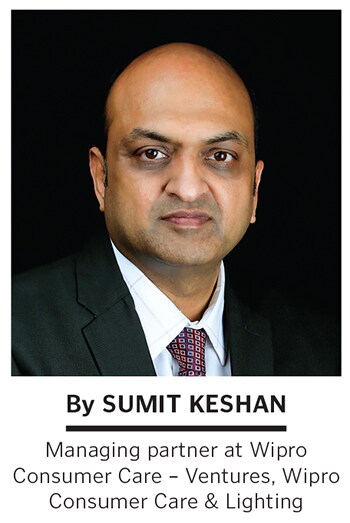
Real victory lies in building a sustainable business: Wipro Consumer Care's Sumit Keshan
Raising money in a tough funding environment is like winning a battle. You still have the war to win, the managing partner of Wipro Consumer Care - Ventures, Wipro Consumer Care & Lighting, writes
 The cardinal principle of running a venture on sustainable business practices is gaining traction, prompting a recalibration of the growth-profitability balancing act, which is a great positive.
Illustration: Chaitanya Dinesh Surpur
The cardinal principle of running a venture on sustainable business practices is gaining traction, prompting a recalibration of the growth-profitability balancing act, which is a great positive.
Illustration: Chaitanya Dinesh Surpur

While winter has started approaching globally in the northern hemisphere, the funding chill in the venture capital world is being felt for over 1.5 years now. The boom of late 2020, 2021 and some part of 2022 is so strongly ingrained in the minds that it has been hard to accept the vicious drop in funding pattern.
However, underlying this funding chill are compelling factors that validate the investment narrative. For instance, amounts committed by LPs (Limited Partners) towards India and SE Asia over the last 1-2 years are sizeable and large, and hence significant amount of dry powder is waiting to be deployed in the ecosystem. The fact that, in one of the earlier years, the total amount raised through PE/VC (private equity/venture capital) channels in India was higher than that raised via IPOs tells us the importance of this form of financing. The acceptance this has achieved in the last decade or so over being also-an-option is now strongly established. From being a tech-focussed avenue to now any and every sector looking for PE money, this has been a fantastic learning journey and fully embedded in the economy’s ecosystem.
The contemporary landscape is witnessing transformative shifts in PE investment strategies and startup management approaches. Many startups are gunning for profitability, and few are profitable already, which is a departure from the earlier approach of growth-at-any-cost. The cardinal principle of running a venture on sustainable business practices is gaining traction, prompting a recalibration of the growth-profitability balancing act, which is a great positive.
As more startups attain profitability and positive cash flows, the overt dependence on continued funding diminishes. Consequently, companies are redirecting focus towards building businesses rather than incessant fundraise efforts. Conversations within the industry are shifting from unit economics to profitability, long cash runways, and to a holistic perspective on performance metrics.







